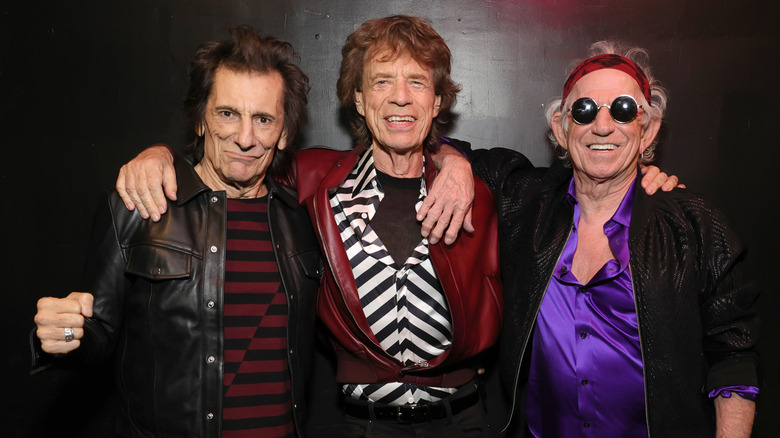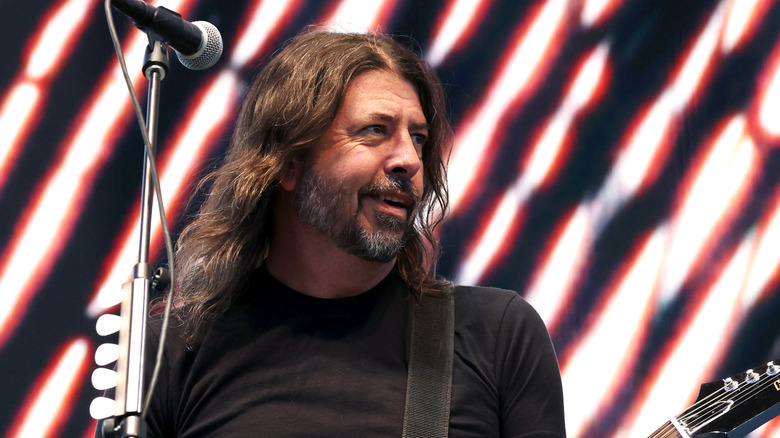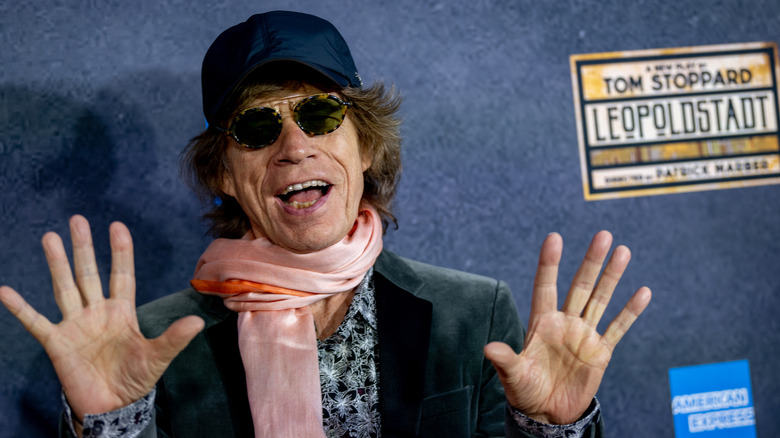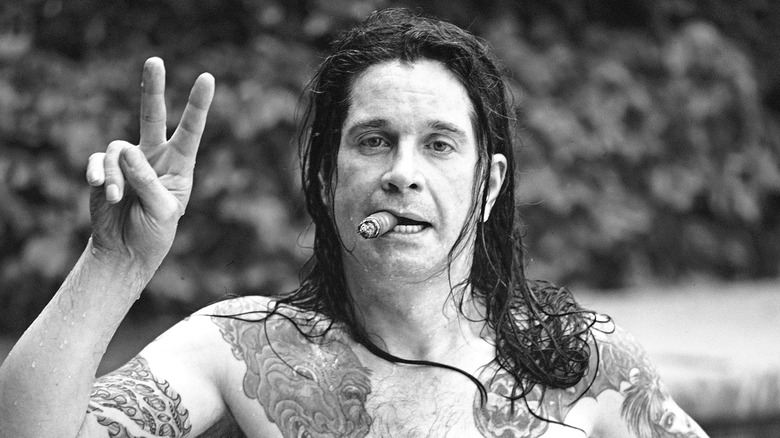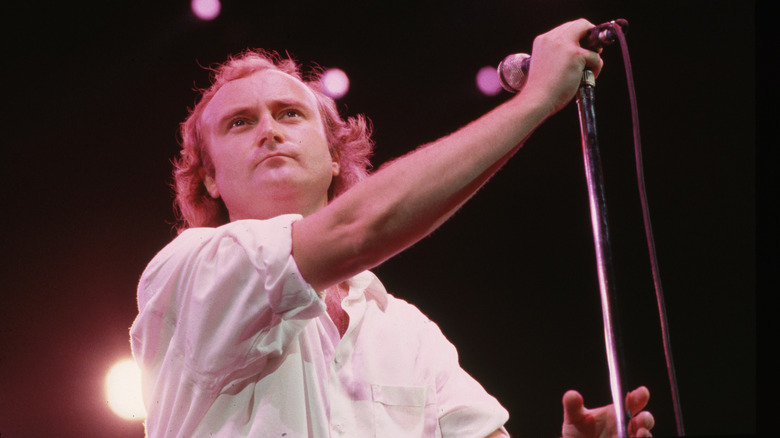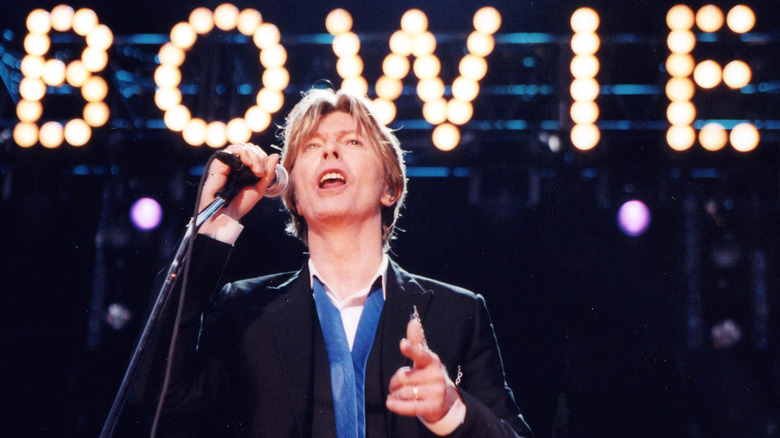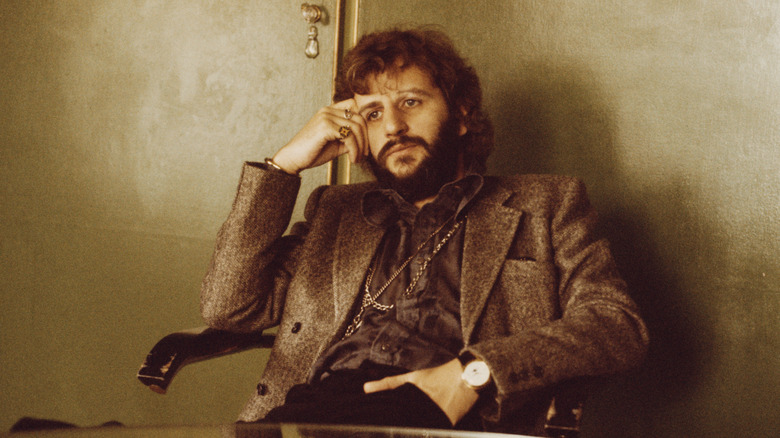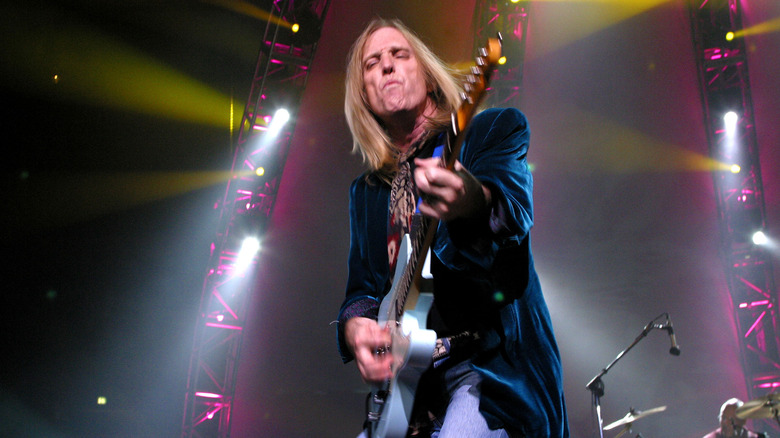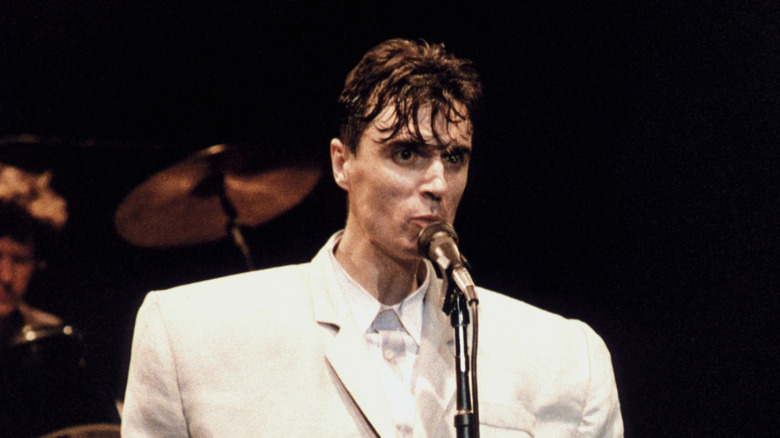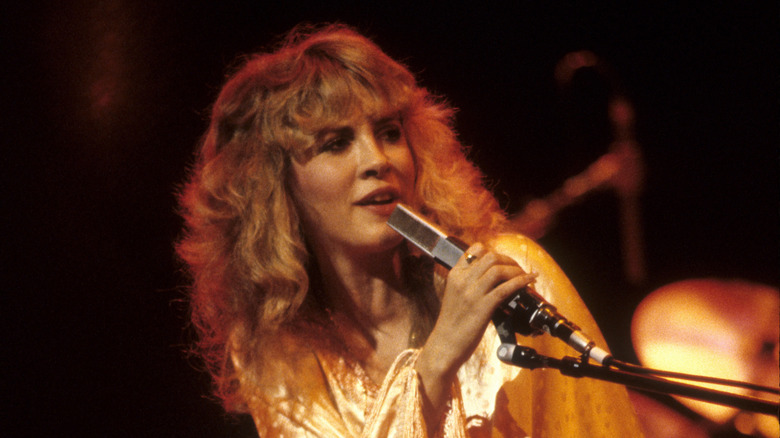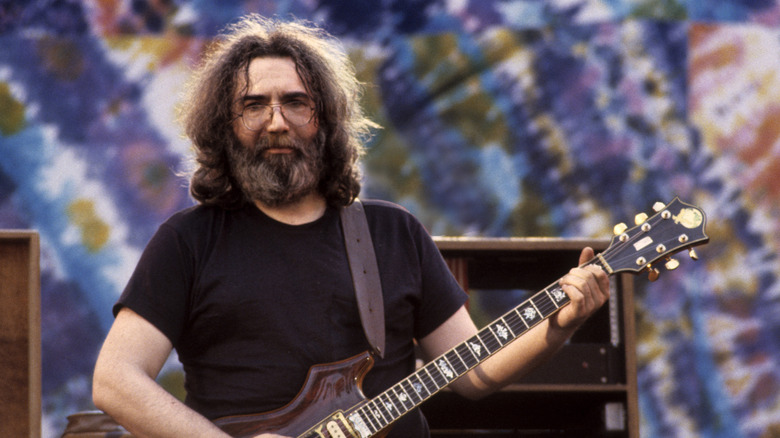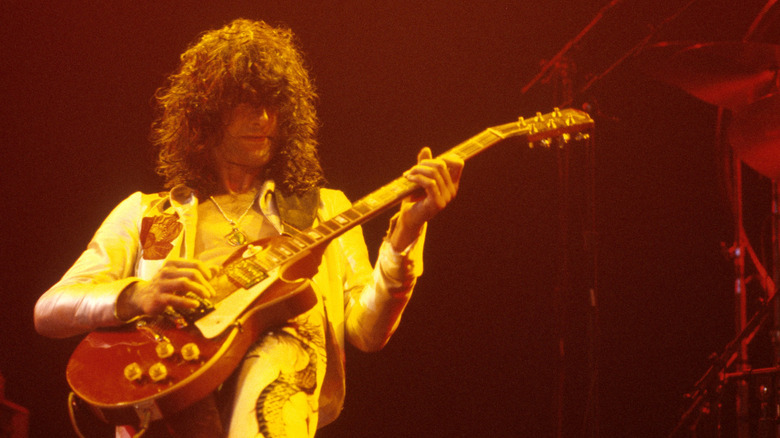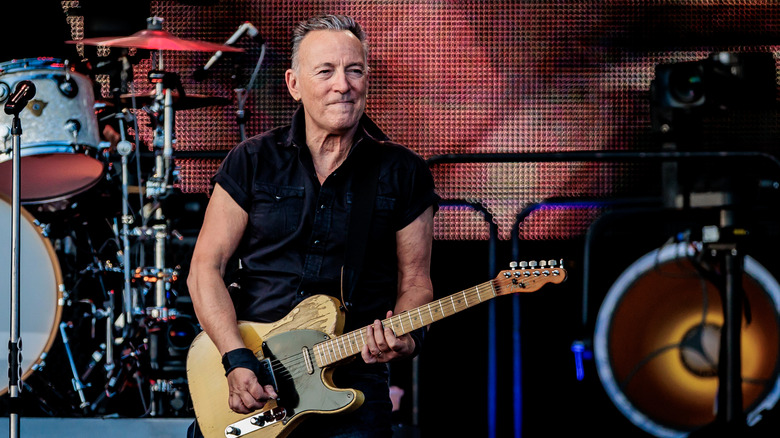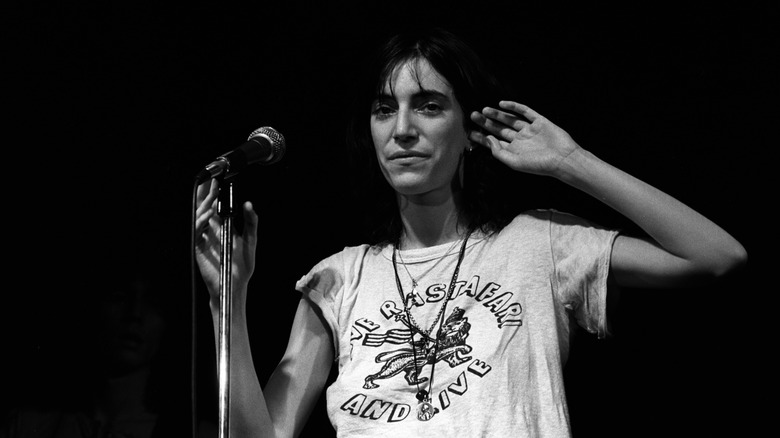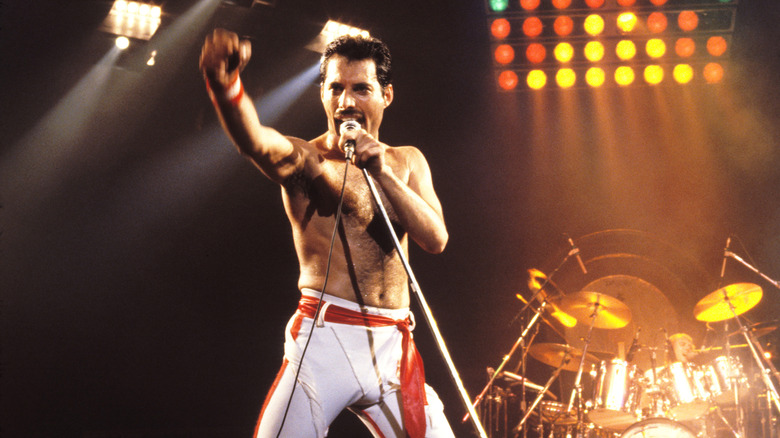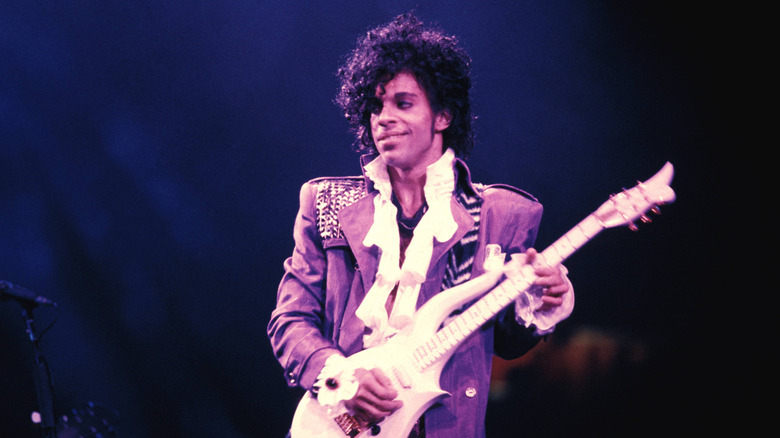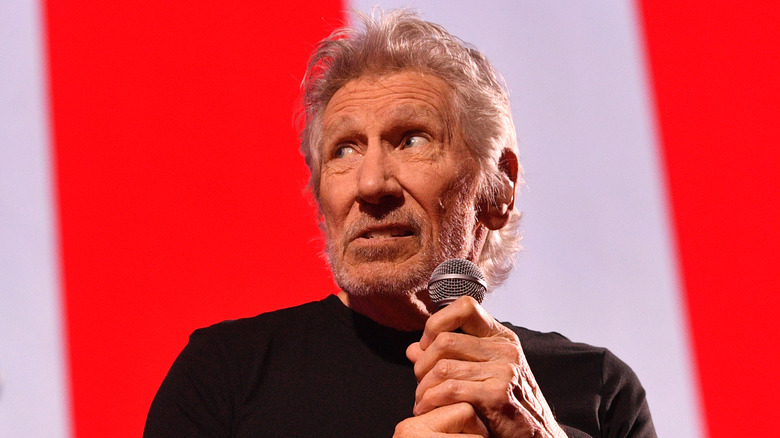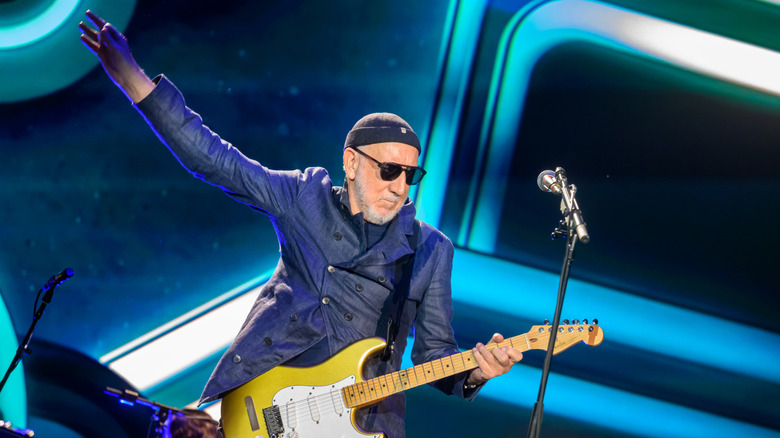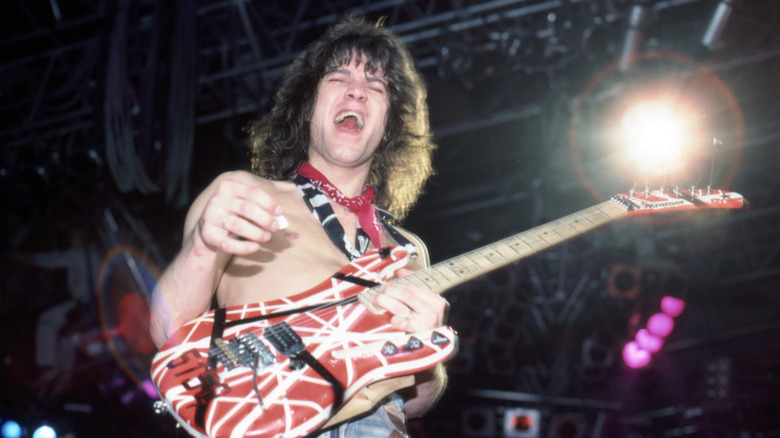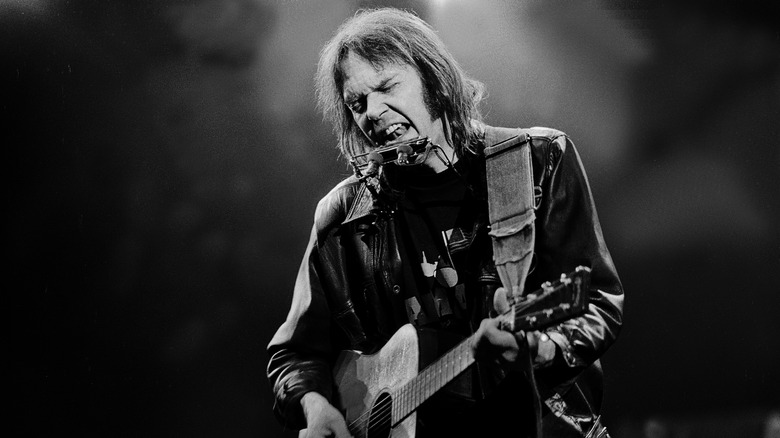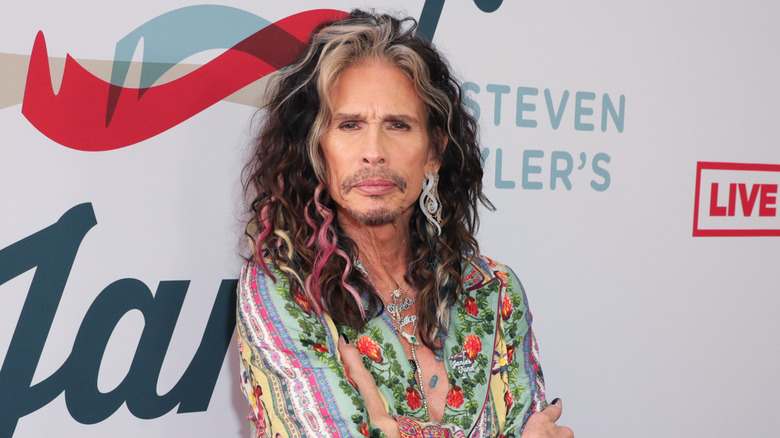Former Bandmates Have A Lot To Say About These Famous Musicians
We may receive a commission on purchases made from links.
Achieving success in the music business is like winning the lottery, yet maintaining that success can prove to be a far greater challenge. That's certainly been the case for many of the most beloved rock bands, with the same creative friction that creates hit songs often leading to conflict between the group's members. Some bands have managed to survive, setting aside personal animus for the greater good of the band (and, to be fair, the mountains of money that can come with it). Others, of course, could simply not hold it together and split up, going their separate ways — sometimes on to successful solo careers, but often demonstrating that a good rock band is a mercurial thing that's more than simply the sum of its parts.
Not surprisingly, musicians have been apt to share their feelings about their musical partners in interviews. Whether those comments are positive or negative, many of these rock stars have held nothing back when offering their unvarnished opinions, and those former bandmates have a lot to say about these famous musicians.
Dave Grohl
When Dave Grohl was invited by Kurt Cobain to sit in with him and bassist Krist Novoselic, Cobain immediately realized he'd found the missing piece that his band, Nirvana, desperately needed. Recalling that moment for Uncut, Novoselic confirmed that Grohl's playing gelled instantly, as did his personality. "Davie is such a good musician, he rose to the occasion — or we rose to him, whichever way it happened," he said. "It just seemed natural and Dave was easy to hang out with."
Cobain's tragic real-life story is well known, and prior to his 1994 death, he shared his own reminiscences of the first time he played with Grohl, and credited the drummer for the band's rise. "This is the first time we've ever felt like a very definite unit," Cobain declared. "The band is finally complete, because all the other drummers we had pretty much sucked."
After Grohl went on to even greater success as frontman for his own band, Foo Fighters, Novoselic insisted he harbored no jealousy toward his former bandmate. "He has stayed focused, he has worked hard, he rocks, the Foo Fighters rock — how do you be jealous of something like that?" Novoselic said during a keynote speech at the 2012 CBGB Festival. For late Foo Fighters drummer Taylor Hawkins, who died while on tour with the band in 2022, his friendship with Grohl ran deeper than just bandmates. "I'm like his little brother," Hawkins once told Rolling Stone.
Mick Jagger
The truth about Mick Jagger's relationship with Keith Richards is complicated, and there have been rocky patches over the years that played out in public. That was particularly true during the 1980s, but Richards characterized their rapport in much sunnier terms when speaking with Men's Journal in 2017. "Smooth. Even. Definitely workable," he said of their relationship at that time. In a 2023 interview with Mojo, Richards compared their "spats" to those of brothers. "We wouldn't be doing this if we didn't have that capability and that respect for each other," he said. "I love the silly sod."
The Rolling Stones' other guitarist, Ronnie Wood, praised the singer's devotion to his health. "He's just so fit, he sets aside three hours a day to do exercise and that's done him plenty of favors in later life," Wood told The Sun. "He's superhuman really."
Prior to drummer Charlie Watts' heart-wrenching death in 2021, he shared rare insight into the private side of Jagger that the public never sees. "You'd imagine Mick would be the happiest guy in the world, and yet a lot of the time he isn't," Watts said (via "The Rolling Stones: Fifty Years"). Meanwhile, former bassist Bill Wyman recalled Jagger's catty side, which emerged when he decided to retire. "Mick would say the most absurd, stupid things, with that spoilt attitude he had," Wyman told Classic Rock. "He'd say things like: 'Oh well, if anybody has to play bass I'll do it. It can't be that hard.'"
Ozzy Osbourne
Rock star Ozzy Osbourne is beloved by his fans, and that affection also carries over to the musicians who've worked with him. Interviewed for AXS TV, his longtime guitarist Zakk Wylde admitted that hanging out with Osbourne is non-stop hilarity that keeps everyone doubled over with laughter. "With Oz, it's a miracle any work ever gets done ... all you have to do is hang out with him for five minutes and you're on the floor crying."
That said, it hasn't all been fun and frolic for all of Osbourne's bandmates, especially the guys who backed him in Black Sabbath. Drummer Bill Ward, for example, issued a lengthy post on Facebook that accused Osbourne of making statements about him that were untrue. "I would want Ozzy to amend his opinions and exaggerations," Ward wrote.
Guitarist Tony Iommi has also had his issues with the singer, particularly when Osbourne publicly told Iommi — who'd continued Sabbath with other musicians — to pack it in. "Don't belittle that band, Tony, move on," Osbourne wrote in an open letter to U.K. music magazine RAW in 1990 (via Classic Rock). In 2024, Iommi confirmed that they'd buried the hatchet. "There was bad blood, but it's water under the bridge," he told Classic Rock. "Ozzy and I have gone through so many things. I played on his last album. Me and Oz are in touch every week."
Phil Collins
Phil Collins was the drummer for British prog-rockers Genesis until singer Peter Gabriel's exit led him to step out from behind the drums and become the band's new frontman. Not only did Collins successfully take the band in a new pop-fueled direction that significantly enhanced the popularity of Genesis, he also branched out with his own successful solo career. In a radio interview (via Rock and Roll Garage), Genesis guitarist Steve Hackett weighed in on why Collins, a former child actor, was poised and ready to take on the frontman position from Gabriel. "You've got to realize — he knew how to carry a tune, and he was very, very good," said Hackett of Collins. "I think, to be able to hold the audience in the palm of his hand. It was something that Phil had because he had the common touch."
Sadly, Collins' deteriorating health — due to a spinal injury — in the latter part of the 2010s made performing difficult. When Collins returned to the spotlight in 2016, Genesis bassist Mike Rutherford felt encouraged. "It's certainly great to see Phil out doing stuff. I think it's going to be very good for him," Rutherford told Ultimate Classic Rock. "He's too strong of a talent to not be doing something in the world."
Collins' injuries forced him into retirement in 2022, something that Gabriel certainly did not see coming. "He was the workaholics' workaholic, so it was strange to see him stop," Gabriel told the Daily Mail.
David Bowie
Prior to his death in 2016, David Bowie embraced numerous personas, from Ziggy Stardust to Alladin Sane to the Thin White Duke. Through all those incarnations and beyond, pianist Mick Garson was by Bowie's side. Echoing what many of Bowie's other bandmates have said about him, Garson recalled being bowled over during his first meeting with Bowie. "You knew you were in the presence of a star. The only other person I'd seen like that was Elvis Presley," Garson said in an interview with Classic Rock.
While Bowie retained Garson after disbanding the Spiders from Mars, he parted ways with guitarist Mick Ronson, who'd been responsible for much of Bowie's Ziggy Stardust-era sound. Ronson's bitterness came through in a 1975 interview with Melody Maker (via Uncut) when he shared plans to confront Bowie in person. "I'm going to get hold of him and smack him across the head, right across the earhole, and try to drum a bit of sense into him," he said. "I wish he could be here, in this room, right now, so I could kick some sense into him."
In another incarnation, Bowie fronted the band Tin Machine. That outfit's guitarist, Reeves Gabrels, revealed that Bowie's creative process was far more collaborative than fans may have assumed. "A lot of people think David dictated every note, but David was like an art director," Gabrels told Premier Guitar. "He assembled people whose work he liked and saw what happened, then edited from there."
Ringo Starr
When it comes to the band that made Ringo Starr a star, the drummer appeared to be untouched by the rancor that brought about the bitter breakup of The Beatles. So, what have Starr's former bandmates had to say about him? When interviewed by Playboy in 1980, John Lennon pointed out that Starr was already famous in Liverpool before joining The Beatles, and believed he would have gone on to greatness whether he was a Beatle or not. "Ringo's talent would have come out one way or the other as something or other ... whether it is acting, drumming or singing I don't know ... there is something in him that is projectable and he would have surfaced with or without the Beatles," Lennon observed.
Paul McCartney also offered high praise to the drummer, noting that despite his lack of formal education, he was surprisingly erudite. "So anything he knows is self-taught, most of it, he's very clever that way. He picks things up and is very witty," McCartney told Mojo. "And, above all else, he's an amazing drummer who just knows how to do it. Simple as that."
George Harrison also shared his observations, focusing on Starr's musical abilities. "As a drummer, I know Ringo is a great drummer, but he's bad," Harrison said in a television interview, referring to Starr's aversion to practicing. "For my songs, he's very good because he listens to the song once and he knows exactly what to play."
Tom Petty
Guitarist Mike Campbell first began playing with Tom Petty when they were teenagers in Gainesville, Florida, and stuck by his side as their first band, Mudcrutch, evolved into Tom Petty and the Heartbreakers. As Campbell explained to The Independent in 2025, they were close, yet their affection for each other was more instinctual than stated. "We didn't have touchy-feely talks," Campbell explained. "We're dudes." When Petty died of an accidental overdose in 2017, Campbell lost not just his friend and bandmate, but the musical enterprise that had taken them from Gainesville to the biggest arenas in the world. "I'm still grieving," said Campbell, nearly a decade after Petty's death.
Petty's loss also hit hard for longtime Heartbreakers keyboard player Benmont Tench. "I'd known him since I was 17," Tench revealed to Rolling Stone, recalling the four-plus decades he'd performed with him. "That's really real, and [his death] took the music away ... we shared a real love for each other."
Even Stan Lynch — who'd been the Heartbreakers' drummer for nearly 18 years before Petty fired him under less than amicable circumstances — was left reeling by news of Petty's demise. "When I heard what happened, it put me right down on my knees, literally," he told Rolling Stone. "I was on my f***in' knees, staring at the sky."
David Byrne
Back in the mid-1970s, singer and guitarist David Byrne formed Talking Heads along with drummer Chris Frantz and bassist Tina Weymouth. The band became wildly successful, churning out a decade's worth of hits until Byrne disbanded the group in 1988 — without bothering to tell the rest of the band, who read about the breakup in a newspaper.
According to Weymouth, Byrne was difficult to navigate, even at the best of times. "I think everybody was always afraid David would crack or break," she said in an interview with Variety. "You really had to walk on eggs, and he could be a bully, but you couldn't do it to him ... David never cared about people ..." In a follow-up interview with The Times, Weymouth explained that "everything with David is transactional — he will use you until he has no more use for you."
Frantz — who is married to Weymouth — has a slightly different take on Byrne, believing that Byrne's callousness toward others is a character flaw over which Byrne has no control. "It's like he can't help himself. His brain is wired in such a way that he doesn't know where he ends and other people begin," Frantz told The Guardian, noting that Byrne simply doesn't have the capacity to factor in the feelings of others. In fact, Frantz also admitted he felt a certain degree of sympathy toward Byrne. "Believe me," he added, "if you knew David Byrne, you would not be jealous of him."
Stevie Nicks
The addition of Stevie Nicks and then-boyfriend Lindsey Buckingham to Fleetwood Mac propelled the band into its most successful period. Yet behind the gold records was interpersonal turmoil, particularly after Nicks and Buckingham ended their romance while remaining bandmates. After Buckingham was fired from the band in 2018, he offered a brutal analysis of Nicks to the Los Angeles Times, accusing her of losing touch with the creative spark she once had. "Also, she's lonely ... She has the people who work for her ..." he added. Speaking with Classic Rock, Buckingham also claimed that Nicks' ego had taken over, and had "sort of gotten a little bit disoriented in her wanting to pursue Stevie Nicks in capital letters, if you will."
Drummer Mick Fleetwood, one of the band's founders, admitted the impasse between Nicks and Buckingham had long been a stumbling block. "It's no secret, it's no tittle-tattle that there is a brick wall there emotionally," he told Mojo of Nicks' rocky relationship with Buckingham.
As the only other woman in the band, Christine McVie admitted that she initially saw Nicks as a rival. "For a while, sure, I got jealous. It didn't last long," she said in an interview clip shared via TikTok. They went on to forge a friendship that lasted until McVie's death in 2022. "We are dear, dear friends," McVie declared in an interview with Rolling Stone. "She is who she is. I am who I am. Easy, easy, easy."
Jerry Garcia
As lead guitarist and musical visionary of the Grateful Dead, Jerry Garcia was the pied piper of psychedelic rock until his sad death in 1995 at age 53. In the opinion of fellow guitarist Bob Weir, the worship he received from Deadheads set the stage for his early exit. "The deification that those folks made of Jerry is basically what killed him," Weir told The Washington Post in 2022. "It disgusted him, and rightly so ... That's a lesson I learned the hard way, from losing a friend."
Late bassist Phil Lesh believed that Garcia lives on through the songs he left behind. "When you're in the song, you're with Jerry," he told Rolling Stone, recalling how he'd recently conjured up a vision of Garcia while performing one of his songs.
Drummer Bill Kreutzmann — who was still in high school when Garcia invited him to join the band — credits the guitarist as his musical mentor, constantly encouraging him to reach new heights. "He was my best music teacher," Kreutzmann said of Garcia when interviewed by NPR. "He taught me more about music than anybody else. And not necessarily just in words, but how he played. The way he played, you can learn so much from it." The band's other drummer, Mickey Hart, believed that if Garcia were still alive, he'd be like the proverbial kid in a candy store when greeted with modern recording technology. "Jerry would be smiling from ear to ear," Hart told Rolling Stone.
Jimmy Page
When The Yardbirds imploded, guitarist Jimmy Page put together a hand-picked group of musicians that became Led Zeppelin. To front the group, he discovered an unknown singer named Robert Plant, forging a musical partnership that resulted in some of rock's most classic songs. "I'd already played with people who'd got the same amount of adrenaline and drive as I'd got and it just so happened that Jimmy had got more than I'd got," Plant recalled to Interview magazine. "He could channel it. He knew which way to let it go. And that was the best thing that ever happened to me, musically ... Perfect relationship."
Led Zeppelin bassist John Paul Jones knew Page from their previous roles as top London session musicians. Jones credited Page as the mastermind who brought together all the elements to create one of the most successful bands in rock history. "We weren't like a group that grew up together and made it big," he said to the U.K. magazine Q in 2007 (via Far Out). "Led Zeppelin wasn't manufactured exactly, but it was put together by Jimmy."
Bruce Springsteen
Bruce Springsteen has been backed by the mighty E Street Band for so long that they're not just a band, they're family. That's particularly true for guitarist Steven Van Zandt, who left the group during the 1980s but returned to the fold a decade later. "You just don't have that many friends for 60 years," he told People. "I think the fact that it survived some ups and downs, it says something about our nature."
Drummer Max Weinberg credits the band's cohesiveness to Springsteen's leadership, something he hadn't really experienced until joining the E Street Band. "I had never played with a group where everybody was focused on one individual," Weinberg told Rolling Stone. "Every group I'd ever played in was fairly chaotic. Here, there was no doubt where the inspiration is coming from."
Nils Lofgren, who paused a successful career as a solo artist to join Springsteen's outfit, sees the Boss as the ultimate multitasker. "He's not only an instrumentalist and the singer. He's gotta navigate the harmony singing and the stage presence," Lofgren told Rolling Stone, while also praising his expansive outlook. "My impression is he thinks as big as possible. Then when he get there, he goes, 'Can I top that?'"
Patti Smith
Emerging in the mid-1970s, Patti Smith blended the hard-driving ethos of punk rock with brilliantly evocative poetry, on display in such songs as "Horses" and "Gloria." By her side through it all has been guitarist Lenny Kaye, who told The Guardian that attempts to pigeonhole Smith within a particular rock subgenre are futile. "She defied categorization, and still does," Kaye said, explaining that her poetic lyrics are at the crux of it all. "She has such a strong sense of cinema and the narratives and journeys her words took reflected that," he added.
Ivan Kral, bassist for the Patti Smith Group, realized he'd found a kindred spirit when they discussed poetry. "I just found Patti interesting, because I studied Verlaine and Baudelaire and fell in love with them before she did," he said in an interview (via Radio Prague International). "I thought, my God, there's someone original who could take it somewhere else."
Freddie Mercury
Anybody who's ever listened to Freddie Mercury sing can attest that there will never be another band like Queen. Guitarist Brian May was his friend and bandmate for decades, yet still found the singer to be something of an enigma. "The workings of Freddie's mind were interesting and sometimes obscure," he told Mojo, noting that Mercury was raised as a Zoroastrian. According to May, the singer that Queen fans came to love did not emerge fully formed, and worked diligently to improve. That was clear when they first entered a recording studio, with Mercury listening back to what he'd just sung and insisting on doing it again. "And he would go back and back and back, until he got it the way he wanted it," May told Ultimate Classic Rock. "So he became, instantly, very aware of what he sounded like, and incredibly quickly fashioned himself into the singer he wanted to be."
Drummer Roger Taylor pointed to that same character trait when he discussed Mercury in an interview with Classic Rock. "Freddie evolved," he observed. "I always called him 'the man who invented himself'. I think the talent was innate, but he dug deep inside himself and forced it out. His determination was quite something."
While Queen did eventually soldier on after Mercury's death in 1991, at the time, bassist John Deacon insisted that it simply wasn't feasible to carry on without him. "It is impossible to replace Freddie," Deacon told Bassist magazine.
Prince
In the annals of rock history, Prince was a complete original, blazing new musical trails while following a vision that was unique as it was brilliant. "Prince pushes the envelope. He is different," bass player Josh Dunham told NBC News. According to Dunham, that also translated to his flair for fashion. "Prince always wore heels. ALWAYS!" Dunham declared. "Even his flip flops had heels."
Guitarist Mike Scott praised Prince's abilities as a performer and as a musician. "Prince was a great guitarist and he was a showman – he knew how to bring a crowd to their knees ..." Scott told Guitar Player. He also remembered Prince as a taskmaster who carried on James Brown's tradition of fining band members who messed up. In fact, Scott recalled a time when Prince made an impromptu musical maneuver that eluded the entire band. "He said, 'I never make mistakes — you all made a mistake by not following me.' So we all got fined," he said.
Prince also had a highly competitive streak, something that percussionist Sheila E. experienced firsthand. Whether it was a game of basketball or some other form of competition, she recalled that Prince tended to pull out all the stops in order to emerge victorious. "Of course I always tried to win, and when I did, it made him mad, and that was funny," she said in an interview with The Hollywood Reporter.
Roger Waters
When singer and bassist Roger Waters parted ways with Pink Floyd, it sparked decades of animosity with his former bandmates, to say nothing of a seemingly endless string of lawsuits. That was particularly true when it came to Waters' infamous feud with guitarist David Gilmour.
Gilmour poured gasoline on the fire when he posed a rhetorical question during an interview with The Times, quipping, "... who knows the mysteries of that crank's mind?" Gilmour had even more to say when he criticized Gilmour's politics during an interview with The Guardian. "I tend to steer clear of people who actively support genocidal and autocratic dictators like [president of Russia Vladimir] Putin and [president of Venezuela Nicolás] Maduro," Gilmour said. "Nothing would make me share a stage with someone who thinks such treatment of women and the LGBT community is OK."
The bad blood extended to the rest of the band. Nick Mason once jokingly compared Waters to Soviet leader Joseph Stalin, while keyboard player Richard Wright admitted that he and Waters had never gotten along. "There has always been friction between me and Roger, right from the beginning," Wright told Classic Rock, recalling an incident when he refused Waters' request to give him a cigarette because Wright didn't like the way he ripped the cellophane off a pack of smokes. "Personality wise, we just didn't get on ... I think, 'Why do you have to say these things?'" he added.
Pete Townshend
The partnership between Pete Townshend and Roger Daltrey has been one of the most enduring in rock history, and one of the most tumultuous. During The Who's rise, the two would battle fiercely, even getting into physical altercations. In his memoir, "Thanks a Lot, Mr. Kibblewhite: My Story," Daltrey wrote about the time he expressed his annoyance when a promotional film the band was shooting was taking too long. Townshend, who'd been downing shot after shot of brandy, fired back angrily. As their war of words escalated, tipsy Townshend swung his Les Paul at Daltrey, barely missing his head. According to Daltrey (via an excerpt in Vulture), "I replied with an uppercut to the jaw. Pete went up and backward like he's been poleaxed. And then he fell down hard, cracking his head to the stage. I thought I'd killed him."
Despite the decades of friction between the two — and the occasional flying fist — Daltrey has maintained that even though he and Townshend don't always see eye to eye, they'll always have each other's backs. "But anyway, all I know is that whatever happens on the public stage, behind the scenes we're the best of friends," Daltrey explained in an interview with Rolling Stone. "We're like brothers. Not to say we get on with each other all the time, but if we were ever in trouble, you know that we'd both be there for each other. That's all that matters."
Eddie Van Halen
It's not hyperbole to state that Eddie Van Halen revolutionized the art of guitar playing, beginning with the debut Van Halen album in 1978 through to the guitarist's sad death in 2020. Offstage, however, Van Halen was reportedly not always easy to get along with. Original Van Halen singer David Lee Roth made that clear in an epic rant he unleashed during a press conference after parting ways with the band, blasting the guitarist for allegedly mischaracterizing his exit. According to Roth, he and Van Halen came to a mutual agreement that their musical differences had grown to the point that it would be best for him to leave. "Two weeks later I'm reading in Rolling Stone what an a**hole I am, and how poor little Eddie was forced to spend the last 12 years of his life living a lie," Roth sneered.
Things ended up in about the same place with Roth's replacement, Sammy Hagar, who likewise left the band under rancorous circumstances. While Hagar is effusive about Van Halen's talent ("Eddie, one of the great genius musicians in rock," Hagar said in an interview with AXS TV), he's also contended that he was not a particularly nice person, particularly during the band's 2004 tour. "He did horrible things to people," Hagar told Guitar.com. "He treated people so badly ... he was a complete raving maniac."
Neil Young
Neil Young's mercurial nature is evident in his albums, which veer from gentle country-rock ("Harvest") to ear-melting near-metal ("Rust Never Sleeps") to rockabilly ("Everybody's Rockin'") to synth-driven electronica ("Trans") and all stops in between. Constantly changing things up, however, wasn't always taken kindly by the other members of supergroup Crosby, Stills, Nash & Young. "God help us if Neil Young became predictable," Stephen Stills told the Daily Beast. He described their friendship, forged when they were young men in Buffalo Springfield, as "an enduring thing." According to Stills, they've been able to overcome any differences they may have had over the years. "I mean, whatever happened, we were always pals," he explained.
That wasn't the case with David Crosby, who had so angered Young by describing his future wife Daryl Hannah as a "poisonous predator" (via Rolling Stone) that they were not on speaking terms at the time of Crosby's heart-wrenching death in 2023. Interviewed by The Guardian in 2021, Crosby didn't mend fences when he described Young as "probably the most selfish person I know."
When speaking with Ultimate Classic Rock, Graham Nash declared his respect for Young, but admitted he wasn't always happy with Young perpetually prioritizing his solo career over CSNY. "So in a way, the best thing that ever happened to CSN was Neil, and the worst thing that ever happened to CSN was Neil," Nash mused. "I know he's a wonderful musician, you know, but he does things occasionally that really piss me off."
Steven Tyler
There's no denying Steven Tyler is among the most flamboyant, mesmerizing frontmen in rock history. He has also clashed with the other members of Aerosmith, and there have been times when Tyler and Aerosmith guitarist Joe Perry couldn't stand each other. Perry addressed that during a 2023 interview with Boston's WCVB Channel 5. "We've had our ups and downs, you know, like everything," Perry said. "There's a balance. It was as bad as it could get. And it's also been as good as it can get." At that time, he pointed out, his relationship with Tyler was in a good place. As Perry further explained in an interview with Classic Rock, their relationship may be fractious, yet there's also a deep bond between them. "This is no bulls***, man, he's probably my best friend through all of it," Perry admitted. "We just know we're different people."
Guitarist Brad Whitford also shared his comments about Tyler when the singer unexpectedly veered into another lane by releasing a solo country album. "But that's Steven," Whitford told Ultimate Classic Rock. "Nothing ever surprises me with him. He's very unpredictable like that sometimes."
